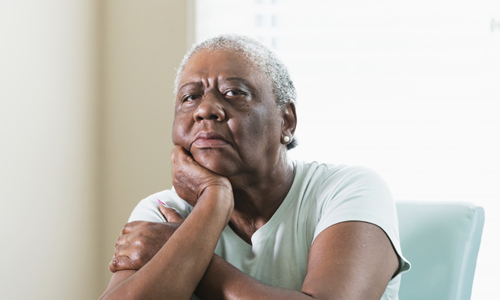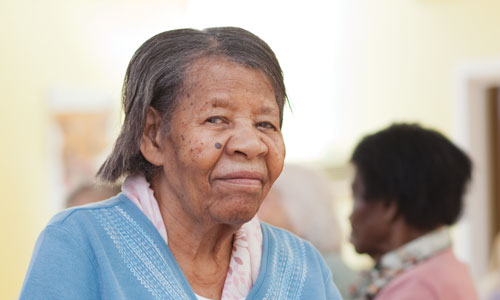In last week’s article for Black History Month, Age UK's Dr Elizabeth Webb presented an updated picture of COVID-19’s impact on Black older people, and what this tells us about continued ethnic inequalities in health.
Coronavirus, older Black people and health inequalities in the UK
Read Dr Webb's updated picture of how COVID-19 is impacting Black older people and continuing health inequalities, the first of our articles for Black History Month 2021.
One of the reasons that ethnic inequalities in health arise is because of the barriers older ethnic minority people experience in accessing health and care services. What are these barriers and why do people of colour face them? And what can be done about it?
Barriers to accessing services
Age UK’s research has highlighted the complexity and nuance of the problem. There are a number of barriers to accessing health and care services facing older people, and these challenges disproportionately affect people of colour. They can prevent or impede access to health and care services, widening pre-existing health inequalities. These barriers include but are not limited to:
A lack of cultural inclusivity
A lack of easily accessible, culturally appropriate information relating to different aspects of health and care, including diet, physical activity, end of life, caring and dementia provide yet another barrier to health services and only contribute to widening inequalities. Age UK’s own information resources could better reflect these preferences, too. We have user-tested resources and have begun work to better reflect a more diverse range of dietary options in our relevant information resources.
Language and communication
For some older ethnic minority people, language and lack of access to necessary translation services acts as a barrier when attempting to access health and care services. This includes face-to-face consultations, as well as accessing information resources, such as written leaflets and appointment letters.
Discrimination
Older people from the UK’s ethnic minority communities have commonly experienced racial discrimination throughout their lives in the UK, including when accessing health and care services. These experiences of discrimination continue into later life.
Geography
Some of these other barriers can have more or less of an impact depending on where you live. In areas where many older people of the same ethnicity live, there are more likely to be specialist services available. In places where there are fewer people of colour living, including many rural areas and coastal parts of the UK, some of the other barriers outlined are exacerbated and access to health and care services can be even more difficult.
Why barriers need to be broken
These are only some of the barriers facing older people from the UK’s ethnic minority communities. But the problem is, every time someone faces one of these barriers in accessing the health and care services they need it only acts to exacerbate existing health inequalities, and can lead to further mistrust.
As a person gets older they typically need to access health and care services more regularly. This need to face discrimination, overcome other barriers to accessing services and mistrust of those very services and service providers who should be relied upon, can stand in the way of necessary treatment. So, what can be done?
How we start breaking down barriers
What can be done to start breaking down the barriers people face when accessing services?
Better data and research
With a lot of the existing research that’s available, including some of our own, the UK’s ethnic minority groups are grouped together. This disguises important differences between groups that have very different experiences, in terms of whether they were born in the UK or migrated here, and under what circumstances, in terms of whether English is their first language, an additional language or they aren’t comfortable communicating in English at all.
This is evidenced in some of our most basic health data which tells us that Black African people have a longer life expectancy than other groups while Black Caribbean people have lower life expectancy than other groups.
Investment and improvement needs to be made - by Age UK and other producers of research and statistics - to collect good quality data to enable a better understanding of how the barriers and inequalities we know exist affect different ethnic groups, and whether there are further issues having an impact on specific groups that haven’t been highlighted.
That feels particularly pertinent this Black History Month, during which we celebrate the history of Black people in the UK.
Addressing structural inequalities
Next week, we will publish an article that explores the socio-economic and structural inequalities experienced by older ethnic minority people in the UK. The experiences of these inequalities throughout people’s lives are an important cause of the ethnic inequalities we see in older people’s health. Addressing socio-economic and structural inequalities can therefore help to reduce the ethnic inequalities we see in older people’s need to access heath and care services.
What’s already being done?
The recent launch of the Office of Health Improvement and Disparities, the aim of which is to tackle health inequalities and reduce disparities across the country, is both timely and welcome. Their focus is to work across the health system, to address wider factors that contribute to health and work to remove the barriers to equal access to health and care services outlined in this article.
We will continue to contribute to this important work.





